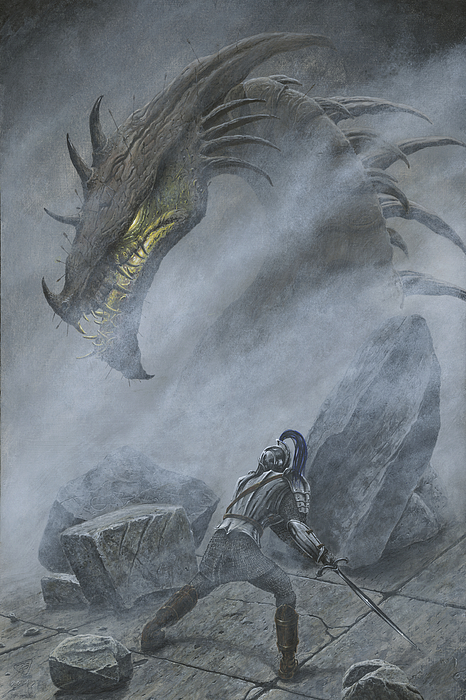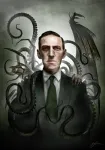Blind Read Through: J.R.R. Tolkien; The Silmarillion, Of Túrin Turambar, Part 5
“And with the beginning of spring Túrin cast off his darkness, and grew hale again; and he arose, and he thought that he woudl remain in Brethil hidden, and put his shadow behind him, forsaking the past. He took therefore a new name, Turambar, which in the High-elven speech signified Master of Doom; and he besought the woodman to forget that he was a stranger among them or ever bore any other name.“
Welcome back to another Blind Read! This week we conclude the tragedy of Túrin Turambar.
Last week we left off with Túrin heading back to Dor-lómin, ignoring Gwindor’s dying wish. This week we pick up with Túrin finding his home but also finding that his mother and sister were gone, so he stopped by the house of Brodda the Easterling. This event is where Túrin completes his transition and becomes Darth Vader (forgive the crossover). The Easterlings tell Túrin that Morwen fled, and the shock of the knowledge opened his eyes, “and the last of Glaurung’s spell were loosed.” In a fury at his loss and stupidity, “he slew Brodda in his hall, and other Easterlings that were his guests.” Once again, becoming a hunted man, only this time by the people of his birth.
And yet Túrin justifies these murders and, in fact, every transgression of his life: “then those deeds wrought are not evil to all. And where else might I have better bestowed my kin, even had I come sooner? For if the Girdle of Melian be broken, then last hope is ended. Nay, it is better indeed as things be; for a shadow, I cast wheresoever I come. Let Melian keep them! And I will leave them in peace unshadowed for a while.” Morgoth will follow his movements because he is an incredible warrior and ignores all else. His youth and hubris show again to justify murder.
So Túrin left to search for Finduilas but found some men in the woods who told him an orc brigade killed her. They showed Túrin the body of the elf-maiden, and he went into a pang of great sadness. The opening quote of this essay comes at this point, making a turning point where Túrin accepts that he is “the Master of Doom.”
Tolkien takes us back to Doriath, where the word that there were some survivors out of Nargothrond, and Morwen, Túrin’s mother, decides she will go and find her son. Unable to stop her in this quest, Thingol bids Mablung go and protect her, but Nienor, Túrin’s sister, disguises herself to go along as well. This is the beginning of a disturbing parallel to the Beren and Lúthien tale. Remember all the times Lúthien disguised herself to go after Beren? Here we have Nienor, whom Túrin hasn’t seen for many years, and in that time, has grown into a woman, sneak out to go help find him, disguised much like Lúthien.
So this group rides out to Nargothrond, only to find Glaurung, so they retreat in haste, but in confusion, Nienor falls from her steed. She gets caught in the gaze of Glaurung, and he understands who she is through his magic. He wipes her memory and personality and turns her into a vegetable.
Mablung finds her and brings her with him, but Orcs assail them in the wild, and in the intervening traveling, Nienor has begun to gain her wits, if not her memory. Finally, the Elves kill the orcs, but Nienor was spooked, and she ran as swift as a horse and got lost in the wilds.
Nienor wandered through the forest; “Nothing did she remember save a darkness that lay behind her, and a shadow of fear; therefore she went warily as a hunted beast, and became famished.” Then she passed into Brethil.
Terrified and alone, she lay down on Haudh-en-Elleth, the burial mound of Finduilas – Gwindor’s prophesy was coming home to roost.
Túrin finds her there and brings her home, comforting her. She cannot even remember her name or that Túrin is her brother.
She had to be taught things “as to an infant” because Glaurung’s magic was that strong, but she learned and became a clan member. Many people had fallen for her, but it was Túrin who asked her hand in marriage, “but for that time she delayed despite her love.” Which was undoubtedly a familial love, not romantic love.
It took three years and a promise not to go to battle if she would marry him, and finally, she did, but even this oath Túrin forsook.
Orcs came and attacked Brethil, and Túrin stayed back at home for a while but eventually took up his black sword and met the orcs in battle. Because of his abilities in battle, word got out that the Black Sword was in Brethil.
Glaurung set a plan and got another army ready to march to Brethil, but he let those plans leak so that the people knew about their fate ahead of time. Terrified, they went to Túrin for advice, “and he counseled them that it was vain to go against Glaurung with all their force” and that he should try to go against the great dragon himself to trick him.
Túrin set off after the dragon, but Nienor was scared to be left behind, so she set off with a company of men after her husband/brother.
Túrin finally found Glaurung sleeping and, through the perils of getting to him, ended up reaching the dragon alone, the few men with him killed.
Túrin, undeterred, found Glaurung still sleeping. “Then he drew Gurthang, and with all the might of his arm, and of his hate, he thrust it into the soft belly of the Worm, even to the hilts.“
Glaurung was grievously injured, but he gazed into Túrin’s eyes and paralyzed the hero.
Meanwhile, Nienor heard Glaurung’s mighty cry and the people of Brethil thought that the dragon was killing the men who went forth, so she left to find him with Brandir, who loved her. He tried to lead her away, but Nienor told him,”‘The Black Sword was my beloved and my husband. To seek him only do I go. What else could you think?” But Brandir suspected the truth; Túrin and Nienor were brother and sister. What’s worse is now they are expecting a child. So Brandir only wanted to protect her.
But being part of the curse of Túrin, she left Brandir and went to find her Husband. When she finally did, lying on the ground seemingly dead, she wept until Glaurung lifted his head and saw her.
Using the last ounces of his life, Glaurung removed the spell, and Nienor suddenly remembered who she was and what she had been doing for the last number of years. She felt the child in her belly, and “she ran from him distraught with horror and anguish, and coming to the brink of Cabed-an-Aras she cast herself over, and was lost in the wild water.”
We see the parallel in the foreshadowing of Saeros at the beginning of this chapter, coming to fruition here.
Túrin woke with Glaurung’s passing and came back to Brethil. He should have been a hero, but when he heard that his wife was dead, and he learned that Brandir had come back to camp telling everyone that Túrin and Nienor (or Níniel as they called her in the base) were dead because of Túrin, what was Túrin to do? Why, what he always did! He killed Brandir in a fury of emotion but soon learned that Brandir was telling the truth and the only exaggeration was that he thought Túrin was dead when he saw his unresponsive form.
Overwhelmed, Túrin felt there was only one more thing to do. So he pulled his sword, Gurthang, and asked it, “Wilt thou therefore take Túrin Turambar, wilt thou slay me swiftly?“
And his sword responded, “Yea, I will drink they blood gladly, that so I may forget the blood of Beleg my master, and the blood of Brandir slain unjustly. I will slay thee swiftly.”
Túrin threw himself on Gurthang, and Gurthang kept his promise and immediately took Túrin’s cursed life.
He died a hero and lay under carven runes in Doriath from then on, a hero despite his curse, and Nienor’s name was on the marker, “but she was not there, nor was it known wither the cold waters of Teiglin had taken her.”
This quote is how Túrin’s tale ends, an ultimate Shakespearean tragedy. But before I let you go, I want to note two things. The first is when Túrin speaks to his sword; not only does Gurthang respond to him, but they both speak in almost biblical language. I think this is Tolkien’s way of indicating Ilùvatar’s influence on the humans, despite his seeming indifference. Just a theory, but the language change has been happening more and more, so I’m going to keep track of when it happens.
The second item is, despite the horror and despair throughout this tale, as in all Tolkien, there’s a measure of hope at the core. Túrin was a great hero, and sometimes heroes need to be formed by adversity. Glaurung had terrorized Beleriand for hundreds of years and was near unbeatable, yet this man, cursed or not, was able to singlehandedly slay the scourge of Beleriand.
It should indicate hope moving forward despite the next chapter’s title: “Of the Ruin on Doriath.”










Hi, Sean! Just curious, but do you know what the “rules” are when it comes to sharing images (e.g. Silmarillion fan art)? I would love to share some of my favorite paintings from The Silmarillion on my blog, but I don’t know if that’s allowed. Thanks!
P.S. The Children of Húrin is a personal favorite of mine! Would you say you prefer it more or TFoG or B&L? Namárië!
August 12, 2022 at 5:48 am
Hi Lily! Basically you just can’t say that you made the art yourself, or be able to show where the art comes from. I’m not profiting from my blog, but that would require permissions from the artists if I did.
I think Beren and Luthien is probably my favorite, but it changes all the time!
August 13, 2022 at 2:56 am
Okay, got it! I have a freelance business that’s linked to my blog/website. Would that mean that I wouldn’t be allowed to use those images, then?
Great choice! The poetry in B&L is great!
August 13, 2022 at 1:42 pm
You could use it, but it opens you up to lawsuits/ cease and desist orders if it bothers them. They may not care however. Unless you’re making a ton of money off of it just giving them the credit of making the art can be enough.
Good luck!
August 13, 2022 at 6:40 pm
Okay, got it. For better or for worse, I don’t think I’m going to be making any money off of my Silmarillion obsession. 😂 Thanks again for your insight!
August 15, 2022 at 2:20 pm